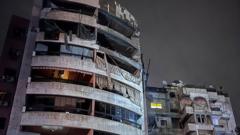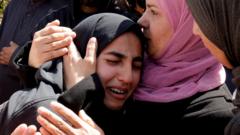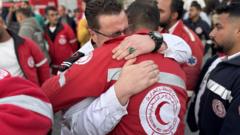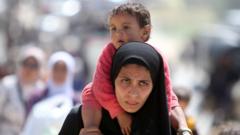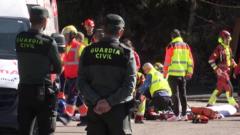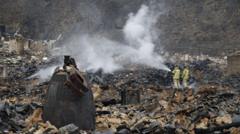Dr. Mark Perlmutter, a U.S. surgeon recently returned from Gaza, describes the dire situation faced by hospitals treating wounded Palestinians, exacerbated by a lack of medical supplies and ongoing Israeli military offensives. He emphasizes the humanitarian crisis as casualties rise, highlighting the efforts of local medical staff amidst unbearable conditions.
Dire Medical Crisis in Gaza: U.S. Surgeon Highlights Shortages Amid Ongoing Conflict
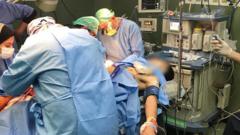
Dire Medical Crisis in Gaza: U.S. Surgeon Highlights Shortages Amid Ongoing Conflict
An American surgeon provides a harrowing account of medical conditions in Gaza, revealing the impact of limited supplies and escalating violence on wounded Palestinians.
An American surgeon who has spent the last three weeks working in Gaza hospitals reported that many wounded Palestinians have perished due to dire shortages of medical supplies and equipment. Dr. Mark Perlmutter described the environment within operating rooms as perilous, lacking essential items such as soap, antibiotics, and x-ray machines, as Israel continues its military operations against Hamas in the region.
Among the most tragic cases highlighted by Dr. Perlmutter was that of a 15-year-old girl, gravely injured by Israeli gunfire while riding her bicycle. Dr. Perlmutter, who has previously criticized Israel's tactics in Gaza and called for an arms embargo, worked during his most recent mission in Al-Aqsa Hospital in Deir al-Balah and Nasser Hospital in southern Gaza under the umbrella of Humanity Auxilium, which is affiliated with the World Health Organization (WHO).
During an airstrike aimed at Hamas finance chief Ismail Barhoum, Nasser Hospital itself became a target, leading to heightened concerns about the safety of civilians in medical facilities. The Israeli military contends that the attack was justified as Barhoum was allegedly using the hospital for terrorist activities. However, Dr. Perlmutter maintains he was present for treatment and should be protected under international law.
Dr. Perlmutter relayed accounts of severe injuries among children, including two 15-year-olds, one of whom lost a limb in a helicopter attack while in a vehicle during evacuation. The personal stories underscore the devastating human toll of the ongoing conflict.
The Israel Defense Forces (IDF) assert that their operational protocols prioritize military objectives and civilian protection, but Dr. Perlmutter presented stark evidence of civilian casualties, including children. He pointed out that many victims succumbed in hospitals that are drastically undersupplied, contributing to a rising death toll since the IDF resumed strikes in March, which has already exceeded 900 Palestinian fatalities.
The humanitarian crisis has worsened as the UN humanitarian chief, Tom Fletcher, emphasized the necessity for assistance as medical supplies stagnate at the borders since March. He urged the international community to uphold humanitarian principles amidst escalating violence.
Dr. Perlmutter’s observations draw parallels between the inadequate medical facilities in Gaza and those in his home state of North Carolina, stating that Gaza's hospitals are ill-equipped to manage the surge of casualties. He described the situation where medical personnel, often working under extreme stress and with limited resources, combat the human cost of war on the ground, devoid of support systems necessary for health care during such crises.
As the conflict continues and casualties mount, Dr. Perlmutter warns that more wounded Palestinians will die without proper treatment, flagging the urgent need for medical supplies and international action to alleviate suffering in Gaza.

